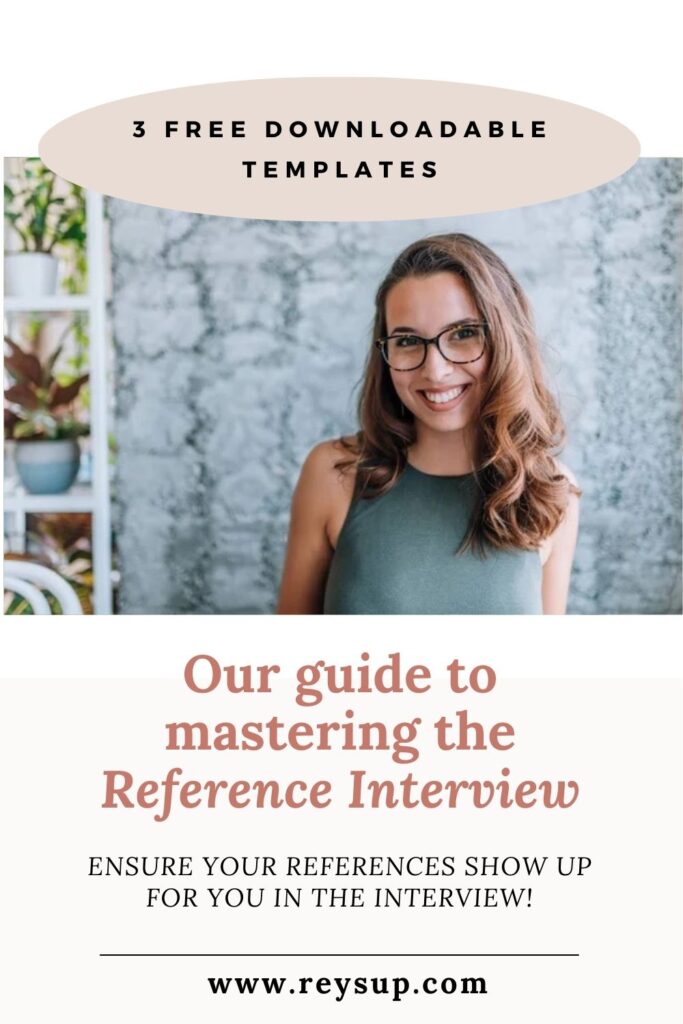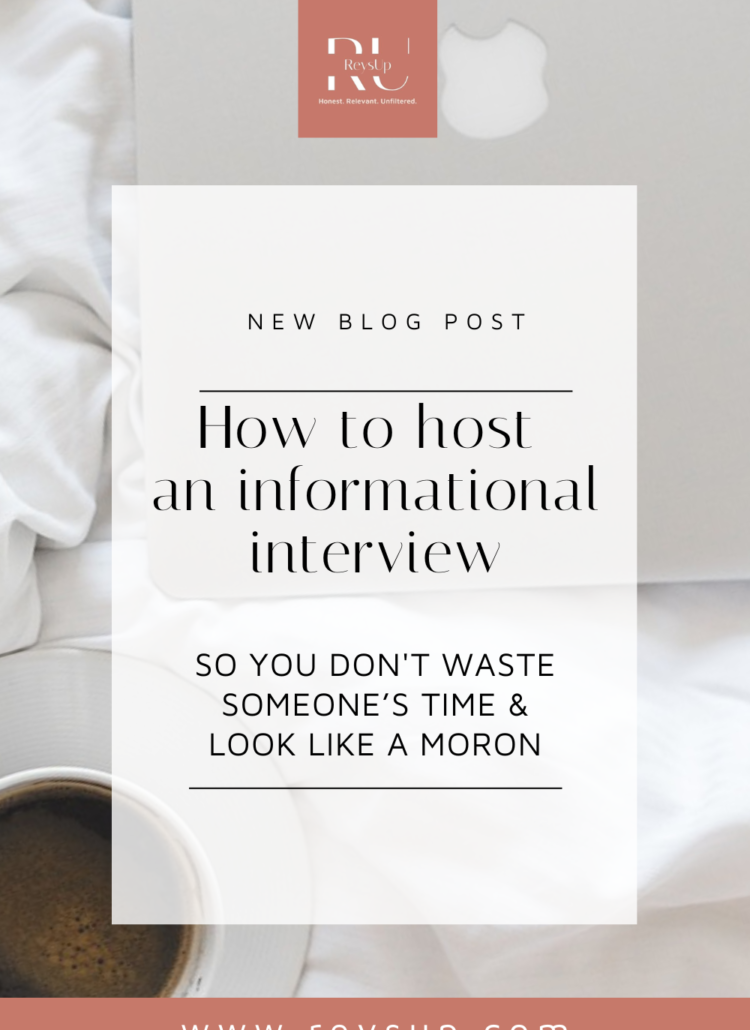This article is all about how to master the reference interview aka how to ask people to be references for you and ensure they advocate effectively on your behalf.
Also make sure to scroll to the bottom of this article for our FREE downloadable templates to master your next reference interview and ensure you are asking the right questions.

When you are applying to a new job, it’s really important to prepare professional references and master the reference interview. No matter how good you are at interviewing or how strong your resume is, it’s always powerful when another professional is willing to put their professional reputation on the line and validate what you are saying is true. Also, not to mention that most candidate reviews these days involve professional reference checks. It’s practically unavoidable, so you have to be prepared.
What a lot of career books and advice givers tend to overlook is the importance of guiding your professional references to say and operate that way you want. In this article, I am going to teach you how to do just that.
3 Steps to Build Your Reference Roster
Step 1: Choose the Right References
The references that you choose will depend on the role that you are applying to. That means, you should have a wide variety and diverse set of references that you can lean on depending on the situation that pops up. I usually advise my clients to break there roster into the following 3 buckets and select at least 2 people per bucket. That way, you aren’t burdening the same person over and over again for the many interviews you have.
The Peer Reference
- Profile of this reference: This reference should be a current or past co-worker that is near or at your current level. It doesn’t necessarily have to be someone on your immediate team, though that is typically better because they can speak in a more educated way about the type of work you do/did. You want to avoid asking people who have completely different job functions. Not because their opinions are invalid (after all, your ability to collaborate with cross-functional teams is important) but because they will likely only be able to speak superficially to your ability and skill sets. And it’s the details that hiring managers are looking to uncover in these convos. If you are at the reference stage of an interview, the hiring manager has already checked the boxes on your high-level qualifications.
- Questions they are likely to be asked
- In what capacity did you work with XYZ and for how long?
- What was XYZ’s role on the team and in your honest opinion, how did XYZ do in this role?
- How did XYZ perform in role relative to the other members of the team?
- In what ways did XYZ contribute positively to the team’s overall morale?
- How did XYZ go above and beyond in role to help other teammates?
- In your opinion, what are XYZ’s top qualities and how do you think those qualities will prepare XYZ for this workplace?
- What (if any) were some developmental areas for XYZ that you witnessed or observed?
Also Read Expert Tips to Email Like a Boss
The Manager reference
- Profile of this reference: This reference should be your current or past direct line manager. Of course, it may be awkward to ask your current manager to be a reference, so for this reason most people opt for a past manager which is 100% okay. The key here is that this has to be someone for formally manage you. It can’t be someone who advised, mentored, or coached you. They will be asked to validate that they managed you in the conversation. The reason this is important is because the hiring manager is going to ask this individual what it was like to manage you. If they weren’t your direct boss, they wouldn’t be able to comment on it.
- Questions they are likely to be asked
- In what capacity did you work with XYZ and for how long? (they are going to ask this to ensure they were in fact your manager)
- What was XYZ’s role on the team and in your honest opinion, how did XYZ do in this role?
- How did XYZ perform in role relative to the other members of the team?
- What are XYZ’s top strengths?
- What are XYZ top developmental areas? Have you seen improvement across these areas over time?
- How does XYZ handle and act on constructive feedback?
- In what ways did XYZ contribute positively to the team’s overall morale?
- What management style works best for XYZ and why?
- If you could hire XYZ again, would you and why?
- Why did XYZ leave your company?
- Is there anything you feel that XYZ may have been too humble to mention but something you think I should know as I consider hiring him/her to my team?
The executive reference
- Profile of this reference: This reference should be someone who is at least 2 levels more senior than you. This does not mean you need to ask the CEO of your past company. Unless you were on the senior leadership team, I would actually highly suggest against that. This needs to be someone who is close enough to know who you are and generally what you do, but higher than your direct boss. The purpose of this reference is to speak to your overall general character and long-term growth trajectory. It is also inherently a test of your networking ability. If you are able to get someone 2 levels above you to agree to be a reference, it means you inherently have a growth mindset and went out of your way to build a brand within your last company, which is a strong sign.
- Questions they are likely to be asked
- In what capacity did you work with XYZ?
- How did XYZ and his/her team contribute to the mission of your organization at large?
- What was XYZ’s role on the team and understanding you weren’t his/her direct manager, how did XYZ do in this role?
- Reflecting on conversations you may have had with XYZ’s lead, were there any developmental areas you know they were focusing on?
- Do you believe XYZ has a strong growth mindset?
Step 2: Ask Your Reference the Right Way
- Once you have aligned on the who, it’s now time to ask them to participate. Keep in mind, when you ask these individuals to be references, you are technically asking them to take time away from their day jobs to help you with no other repayment except for your appreciation. And that is ok! This is how the professional world works and it’s very likely that someone you ask to be a reference has asked someone else to be a reference for them. That said, there is a right and wrong way to go about this.
- The first thing to remember is that you need to ask them well in advance. Do NOT wait until a few days before the interview. I usually advise my clients to just build a general roster and tell the references that you do not need them to take action at this very moment, but that you want to call on them in the future as things come up.
- The second thing to remember is that the frame is important. Even if these people are your friends, you want to remain professional and ask with tact and care. You also need to explicitly give them the option to say “no”. This way, you don’t run into a situation where someone is not comfortable giving you a reference but they are also not comfortable saying no, so they go through it and it hurts your chances.
Step 3: Provide Guidance and Direction to Your Reference
- This is arguably the most important part of this entire process for two reasons. One, you do not want to create unnecessary work for these people. They are busy and they are the ones doing the favor for you and you should be the one doing the heavy lifting. Two, by providing this info, you are tactfully guiding your referral to say what you want them to say and focus on the accomplishments / development areas you want them to highlight.
- To make it as easy as possible, I advise my clients to prepare a “reference cheat sheet” for your referral to reference during their convo with the hiring manager. You can find our FREE ReysUp templates below for download!
- This template includes the questions your referral could be asked so they know what to prepare, along with some quick, easy to digest bullets around why you are interested in the role / team / company, your most proud accomplishments to date, and your self-identified development areas.
- For my overachievers out there, I also advise my clients to set up 10 mins with each reference prior to their conversation to review the cheat sheet. This way, they can ask any clarifying questions and you can ensure they get the frame right.




